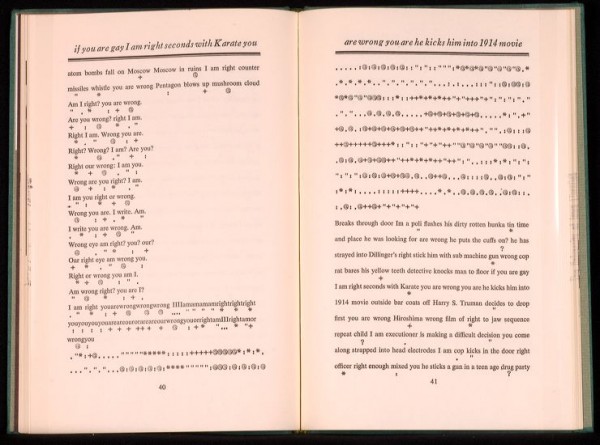The running head on these two pages of William S. Burroughs’s cut-up text “Word Authority More Habit Forming Than Heroin” reads: “if you are gay I am right seconds with Karate you are wrong you are he kicks him into 1914 movie.” The spread appeared in an exhibition, “Liberated Images,” at the University of Iowa Museum of Art. A symposium took a detailed look at “the subversive culture of collage and zines.” Yes, Iowa.
The text, published in Brion Gysin Let the Mice In, in 1973, originally appeared in the first issue of the San Francisco Earthquake, a little magazine, in 1967. The exhibition ran in 2005. I’m only seven years late on this, but what the hell. See all the images in the exhibition, from Dada onwards. The Burroughs text (incidental intelligence: it’s mislabeled as Gysin’s) appeared along with a pair of collages by Norman O. Mustill in a section called The Beats 1950s and 60s, which also included the cover collage of All of Ted Joans and No More.
Postscript: Nov. 29 — An Iowa native writes:
Interesting Iowa show. Curious they don’t even mention in passing the local art or literary magazines (“zines”) or collage art done in the ’50s ’60s and ’70s in Iowa (which was considerable). Obviously they wanted an internationalist gloss on this.
Which is one reason I left Iowa: there was no way to get any credit or attention for anything done in the “provinces.”
Amazing.
And this just in … talk about provincial … BBC Radio 4 today. I wonder what stirred their pot?
Think of American writers in Paris and the chances are the first people to come to mind are the Lost Generation of the 1920s – Fitzgerald, Hemingway, Stein and friends. But a period every bit as significant in the development of American letters and the culture more broadly is often overlooked.
Professor Andrew Hussey tells the story of how a dirty, run-down hotel in the medieval heart of Paris became in the late 1950s and early 1960s a bohemian mecca, attracting some of the most important figures of the Beat Generation. And not only did those individuals live there, they also thrived among the more liberal social attitudes than they’d grown up with in America, creating some of their most important work. Allen Ginsberg wrote much of Kaddish, William Burroughs completed Naked Lunch, Gregory Corso wrote BOMB; it was here that the famous cut-up technique so important to Burroughs and so influential on modern culture was invented by Bryon Gysin, and also the place where the Dream Machine – a means of inducing drug free hallucinations – was developed by Burroughs’ lover Ian Sommerville.
Andrew [that first name familiarity is so cute] will also show that the Beats were much more engaged with their French surroundings than has previously been thought, meeting many of the most important European artists of the day and witnessing the frequent violence that the Algerian War brought with it to the streets in their immediate vicinity. He will make clear that the Beat movement — so often identified as strictly American in its focus — was in fact passionately internationalist and a key influence in global avant-garde political aesthetics.
Isn’t that interesting … And zose akzents, zay are zo vunzairfuhl … Listen. OK, so I’m being sarcastic. It actually is a nicely put-together program.





